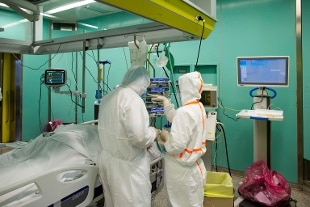- Coronavirus, new positives increase. Other doctors died. More cases in Codogno
- WHO: heroic Italian doctors, incredible government commitment
Share
March 28, 2020 It is difficult not to predict that 100% of the 'ordinary' activities planned in Italian hospitals would have overshadowed the coronavirus emergency. Furthermore, it is necessary to compensate the resources in the Covid departments to protect patients and healthcare professionals with the social distancing necessary to stem the spread of the virus.
There are "At least one million hospitalizations postponed for a pandemic in four months, including over half a million for non-urgent surgery, ranging from hip replacement to herniated disc, through dermatological surgery". This was stated by Americo Cicchetti, director of the high school of economics and management of health systems of the Catholic University of Rome. "But this means that we will find ourselves at the end of the pandemic, hopefully by June, having to recover a whole series of interventions." The repercussions on the waiting lists for the whole of 2020 and beyond will be heavy. "To calculate the effects, just understand how many surgical drg are done in four months and that have been suspended.
According to the report on the hospital discharge sheets of 2017 (last available data), every month in Italy - explains the expert - there are about 673,000 hospitalizations for acute patients (i.e. excluding rehabilitations and long-term care). whereas half of these are deferred (while the other half are urgent and are guaranteed), in March, April, May and June approximately one million hospitalizations will be missed in Italy, of which at least 510,000 for surgery and the remaining for therapies and hospital pharmacological treatments ". Many will be moved to after the end of the emergency and will be added to what would normally be. For example, in neurosurgery very few operations are now being done, almost essentially for brain cancer. In gastroenterology all operations are stopped except those for colorectal cancer, for example, stop hip replacements, knee operations, surgical operations to remove moles, unless they are dangerous, and those for varicose veins.
"After June we hope for a gradual return to normal in terms of the health organization, but that too will be a long and difficult phase. This means - concludes Cicchetti - that in the months following the end of the pandemic we will have great pressure on hospital activity, which will at least double or triple the time of waiting lists. And the queue in organizational terms will continue throughout 2020 and beyond ".

